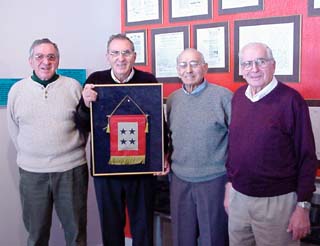
times four At 80 years old, Bill Sirianni knows he has been blessed. "It's been a good life," Sirianni says as he sits at the kitchen table talking about what he holds most dear - his wife of 58 years, Dee, his children and his grandchildren. He and Dee now enjoy life in the Village of Spencerport, living in an in-law apartment built off of their son's home. For Sirianni, the days of ducking bullets as they came raining down from the sky is a faint memory, one that serves to remind him how great life is. Bill is one of four brothers, born in Olean, New York, who left their hometown to defend their country during World War II. While, like many other men and women their service was heroic, it may be most notable because all four boys made it home alive and are still around 60 years later to talk about it. Even though it is an impressive tale, reliving the moment isn't a preoccupation of Sirianni, or his brothers. In fact, he is amazingly understated when asked about his service. The story of the four Sirianni brothers probably wouldn't have even been told today, had it not been for a trip the brothers took to the National World War II Memorial in Washington last year. When they returned home from Washington, one of the brothers submitted a photo of them in front of the monument to a local Olean newspaper. The Times Herald decided to run a small article with the picture, which caught the attention of the Eldred World War II Museum in Eldred, Pennsylvania. The Sirianni brothers were invited to the museum to share their stories and their visit garnered even more media coverage. While their individual efforts were varied and remarkable, when Bill talks about WWII, he is sharing a story of family and four brothers who grew up in Olean. "My mom just worried constantly, especially for Dan," says Sirianni. His brother Dan, who now lives in Ellicottville, probably came the closest to not returning home. A member of the Army Air Corps, his airplane was shot down during a bombing mission in Schweinfurt, Germany. While parachuting down, he was circled repeatedly by a German plane. The pilot got close enough to wave at him and then flew away. Soon after landing he was taken into custody and remained a prisoner of war for two years. The eldest brother, Al, who is 86 years old, joined the Army and worked guard duty on both the east and west coast. From there he was shipped to England where he basically served the role of a military claims investigator, processing claims by residents who had suffered property damage at the hands of soldiers. The youngest, Jim, joined the army toward the end of the war and never had to leave native soil. Bill's Army adventure included extensive travel. He was drafted out of high school in April 1943 and became a cook and eventually a mess hall sergeant. He served three years before an honorable discharge in 1946. The last combat he saw was at the Battle of the Bulge. He was part of the 84th Field Hospital, which treated frontline victims who couldn't be handled by the medics of the first aid station. Being so close to the frontline, Bill saw a lot of action. He can remember nightly visits during the European Campaign from "Bed Check Charlie" who would fire a few rounds at the camp and then fly off. During his service, he prepared thousands of meals for doctors, nurses, wounded soldiers and prisoners. He can remember throwing leftover food in a huge hole each evening and covering it with earth. He can recall locals diving into the pit for scraps. Bill remembers the army deciding to install checkpoints. German soldiers were wearing the uniforms of killed American soldiers to infiltrate the barracks. To prevent this from happening, all soldiers were stopped at various checkpoints and asked questions about actresses, baseball and comic strips. The men who had trouble answering were taken into custody. As long as he lives, Bill will still see the concentration camps. President Eisenhower had determined that all soldiers within 250 miles of the concentration camps needed to be transported in to help them understand what the country was fighting for. Despite vivid memories of unpleasant moments, Bill believes he has led the good life - good parents, great wife, loving family. He holds on to his father' words. "Dad always said 'If you have a dream pursue it and work at it,' " Bill said. The work of the four Sirianni boys, now 60 years ago, has made dreaming still possible for children today. |
